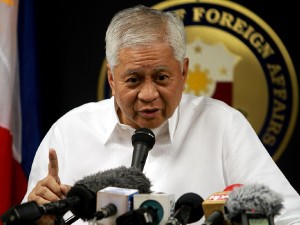China denies it is to blame for ASEAN failure to issue communique
MANILA, Philippines – China has dismissed accusations it was responsible for the failure of the Association of Southeast Asian Nations to issue the traditional joint communique at the end of the 45th ASEAN foreign ministers’ meeting held in Cambodia.
“China believes that at the meeting series of the ASEAN Regional Forum, parties involved exchanged ideas on East Asian regional cooperation and major regional and international issues,” Foreign Ministry spokesman Liu Weimin said in an article published by China Daily on Friday.
“China’s views and positions on issues in various fields were well understood and received support from many countries,” he said.
The Philippines on Friday deplored the non-issuance of a joint statement, which was unprecedented in ASEAN’S 45-year history.
A joint communiqué would have included ASEAN’S stand on the territorial disputes of some members of the bloc with China in the West Philippine Sea (South China Sea).
Foreign Secretary Albert Del Rosario said that the Philippines took strong exception to the statement made by Cambodia, host of the meeting, that this would be “the first time that ASEAN is not able to issue the joint communiqué due to bilateral conflict between some ASEAN member states and a neighboring country.”
He said he discussed the situation at Scarborough Shoal (Panatag Shoal) in several meetings in Phnom Penh starting Monday.
“There was a considerable amount of discussions on Scarborough Shoal in all of the forums that were held there,” Del Rosario told reporters. “I think we were successful in being able to bring to the [forums] the challenges that the Philippines faces in that area.”
Explaining the controversy about the ASEAN joint statement, Del Rosario said: “We simply wanted the fact that we discussed the issue and it should be reflected in the joint communiqué, no more, no less. It would have just been a simple sentence or paragraph in the communiqué. We just want a recognition that the Scarborough Shoal was in fact discussed.”
Del Rosario said several ASEAN states and the Asean secretariat supported the Philippine position that the Scarborough Shoal discussion should be reflected i n the joint statement.
“However, the chair [Cambodia] has consistently opposed any mention of the Scarborough Shoal at all in the joint communiqué… he said he doesn’t want to mention bilateral issues,” Del Rosario said. “But if you look at many of the issues that we had, all of them have a bilateral aspect to it.”
Asked if Cambodia was pressured by China, Del Rosario said: “I don’t want to speak for the chair. That question should be answered directly by him. But at one point, he indicated that he had political reasons.”
Del Rosario said the ASEAN consensus reached during the senior officials’ meeting in June on the elements of a code of conduct in the West Philippine Sea clearly underscored the pursuit of a multilateral resolution of the disputes.
However, China insists on dealing with the countries concerned bilaterally and has criticized outside intervention.
China said earlier it was willing to discuss the Code of Conduct (COC) in the South China Sea with the ASEAN countries when conditions mature, Liu said in a separate article posted on the Chinese government web site.
Liu said that senior officials from China and ASEAN countries conducted informal discussions regarding the COC in Phnom Penh, Cambodia on Sunday.
During the meeting, all parties agreed to fully implement the Declaration on the Conduct of Parties in the South China Sea signed 10 years ago by China and ASEAN countries, as well as carry out substantial cooperation under its framework, Liu said.
“As for formulating the COC in the South China Sea, China has said repeatedly that it is willing to discuss the issue with ASEAN countries when conditions mature,” said Liu.
He stressed, however, that the COC is not designed to solve disputes in the South China Sea, but to promote mutual trust and cooperation between parties.















